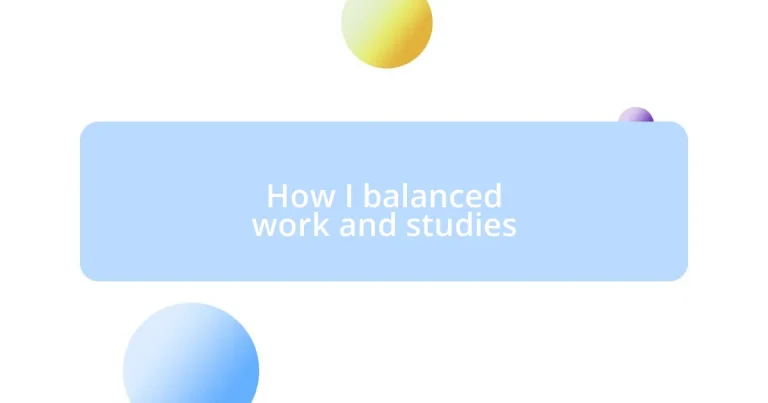Key takeaways:
- Achieving balance between work and studies requires conscious effort and self-awareness, essential for productivity and mental well-being.
- Effective time management techniques, like the Pomodoro Technique and the Eisenhower Matrix, can significantly enhance focus and productivity.
- Setting achievable, measurable goals and regularly evaluating progress helps maintain motivation and allows for adjustments to strategies when necessary.
- Establishing a routine, seeking accountability, and remaining flexible with plans are key to navigating challenges while balancing multiple responsibilities.
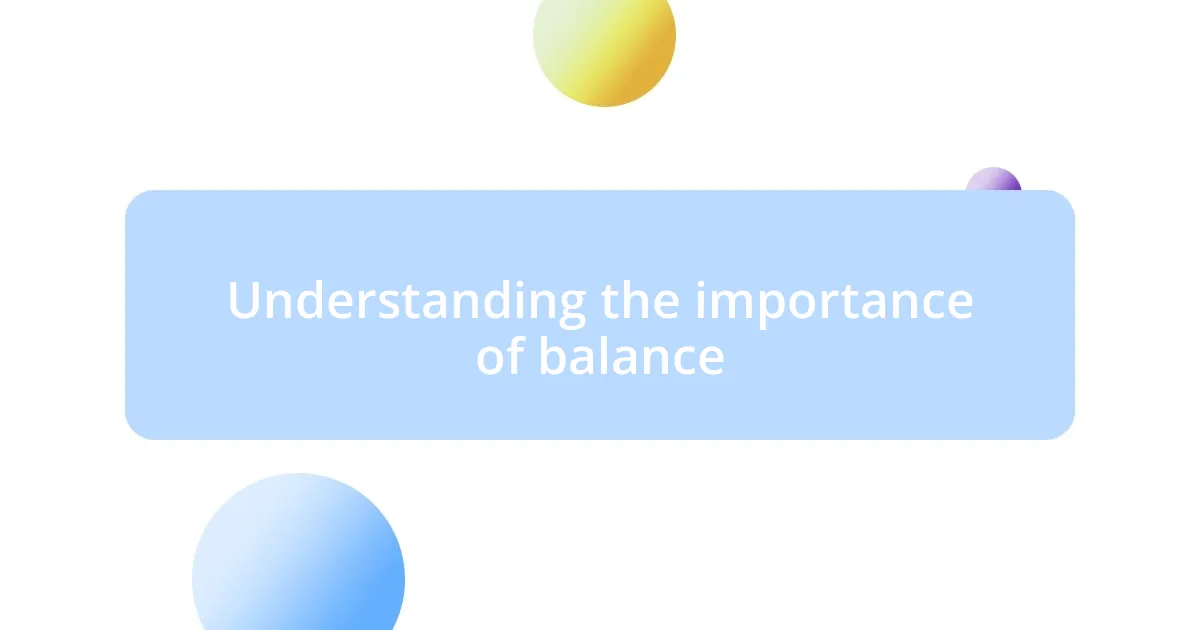
Understanding the importance of balance
Finding the right balance between work and studies often feels like walking a tightrope. I remember those late nights when I juggled assignments and late shifts; it was challenging, to say the least. It hit me one evening, staring at my half-done project while simultaneously checking emails, that this imbalance couldn’t continue.
In my experience, maintaining equilibrium is crucial not only for productivity but also for mental well-being. When I allowed stress to take over, I could see my focus wavering. Have you ever felt that overwhelming pressure when deadlines coincide with work commitments? It’s a universal struggle, and recognizing it is the first step to achieving that harmony between our responsibilities.
Balance doesn’t just happen; it requires conscious effort and self-awareness. I often reflect on how I managed my time during my busiest semesters. Perhaps you’ve experienced that satisfying moment when everything aligns, and you find joy in both your studies and job. That sense of achievement is what reminds me that balance isn’t merely a concept, but an essential part of life that fuels our motivation and passion for our pursuits.
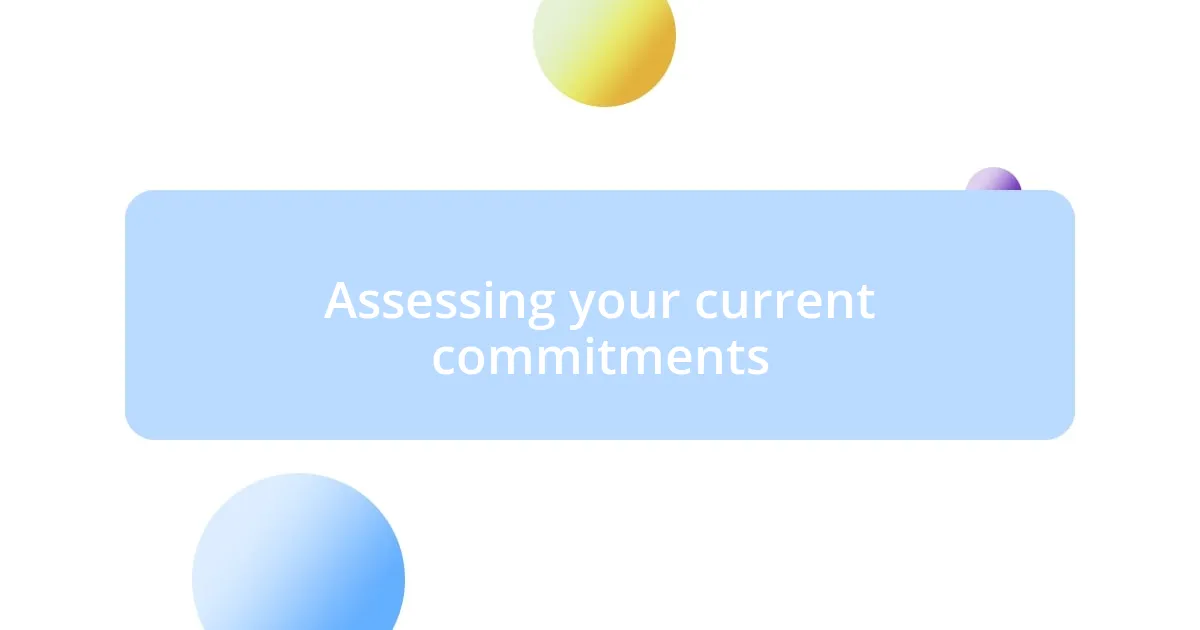
Assessing your current commitments
Assessing your commitments is a crucial first step toward achieving balance. I vividly remember sitting down one weekend, feeling overwhelmed. I took out a notebook and mapped out my responsibilities—work, classes, and social commitments. This exercise was eye-opening; it helped me visualize what needed my attention most urgently.
To assess your commitments effectively, consider these key points:
- List Your Responsibilities: Write down everything you’re currently involved in, from work to personal obligations.
- Evaluate Time Requirements: Estimate how much time each commitment consumes weekly.
- Identify Priorities: Recognize what’s most important to you; this will guide your decisions moving forward.
- Reflect on Your Energy Levels: Consider when you feel most productive and when you generally crash.
- Seek Feedback: Sometimes, discussing your commitments with a trusted friend or mentor can unveil new perspectives.
Taking these steps helped me uncover areas where I could either delegate or cut back, allowing me to reclaim those precious hours for study and self-care.
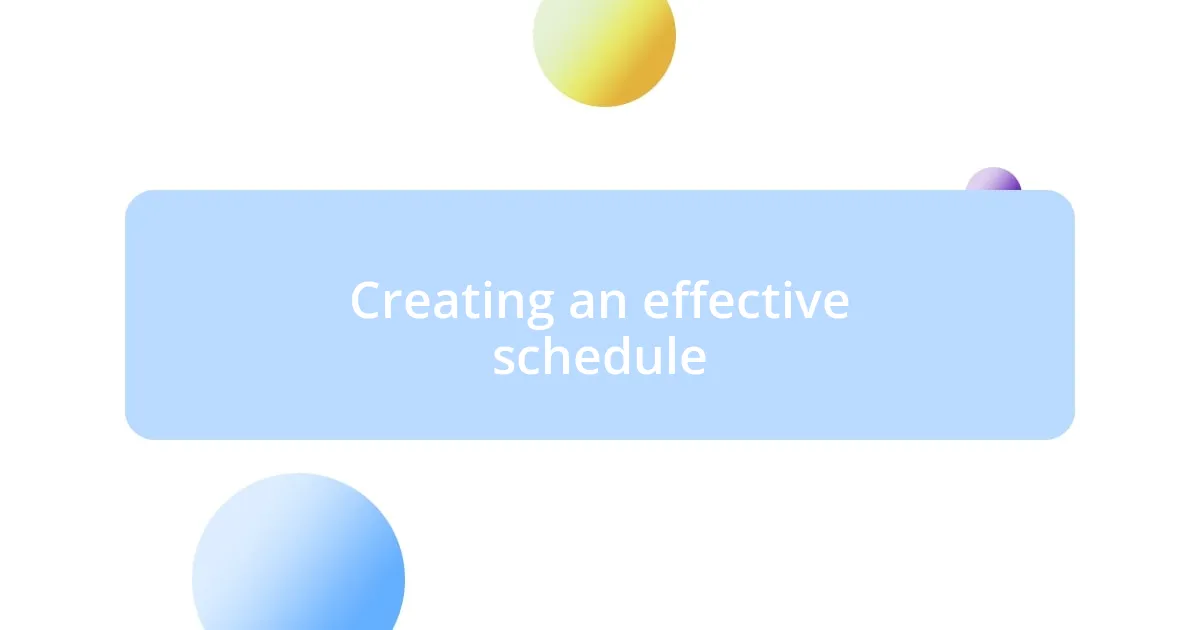
Creating an effective schedule
Creating an effective schedule is like crafting a roadmap for your time. I remember when I first started juggling work and studies; I felt lost without a clear plan. After a few frustrating weeks, I decided to dedicate a Saturday morning to structure my week. It was refreshing to write down tasks and allocate time slots for each one. That simple act transformed my approach, turning chaos into a manageable schedule.
I realized that flexibility is key in creating an effective schedule. While it’s great to have a plan, life sometimes throws unexpected challenges our way. I learned to build in buffer time for tasks and break my study sessions into manageable chunks. This way, if something urgent came up at work, I wouldn’t be thrown off course. It’s all about adapting your schedule to meet both your academic and professional responsibilities without compromising your well-being.
Here’s a helpful comparison of two scheduling methods that can guide you in finding your own effective approach:
| Traditional Scheduling | Time Blocking |
|---|---|
| Involves creating a daily to-do list | Divides your day into specific time blocks for tasks |
| Focuses on prioritizing tasks by deadline | Emphasizes dedicated time for each activity, reducing distractions |
| Often leads to feeling overwhelmed due to longer lists | Creates a sense of accomplishment as you complete blocks |
| Less flexibility in adjusting tasks on the go | More adaptable to changing circumstances, allowing real-time adjustments |
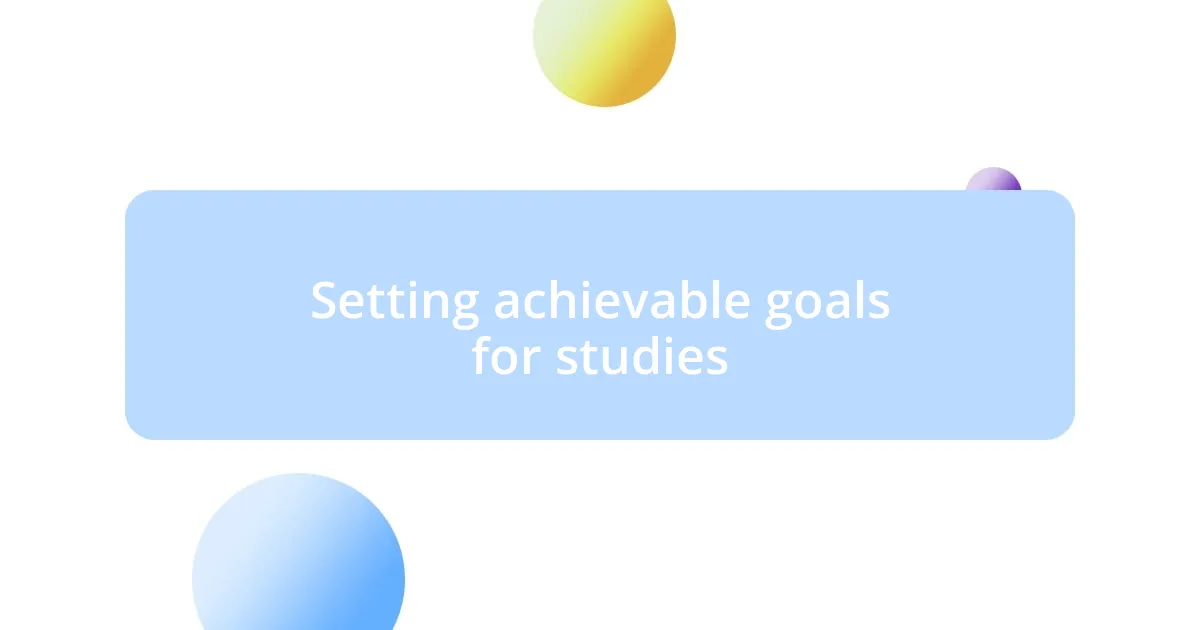
Setting achievable goals for studies
Setting achievable goals for studies can feel daunting, especially when balancing multiple commitments. I remember a period when my workload felt like a tidal wave crashing down on me. To combat this, I started by setting specific, measurable goals for my studies—like dedicating two hours each evening to a particular subject. This small change made a significant difference, allowing me to focus without feeling overwhelmed.
Breaking larger goals into smaller, bite-sized tasks can also be incredibly effective. For example, instead of telling myself to “study for the exam,” I would plan out sub-goals, such as “review chapters one and two” or “complete practice questions for one hour.” This approach not only made the studying process less intimidating but also offered me a sense of achievement with each small goal completed. Have you ever felt the rush of checking something off your list? It’s a boost that keeps you motivated!
Lastly, be sure to celebrate your successes, no matter how small. I vividly recall finishing my first assignment ahead of time and treating myself to a coffee date with a friend. It reaffirmed my commitment to my goals and made the journey feel worthwhile. By setting achievable goals, you create a pathway to success that feels not just manageable—but also enjoyable!
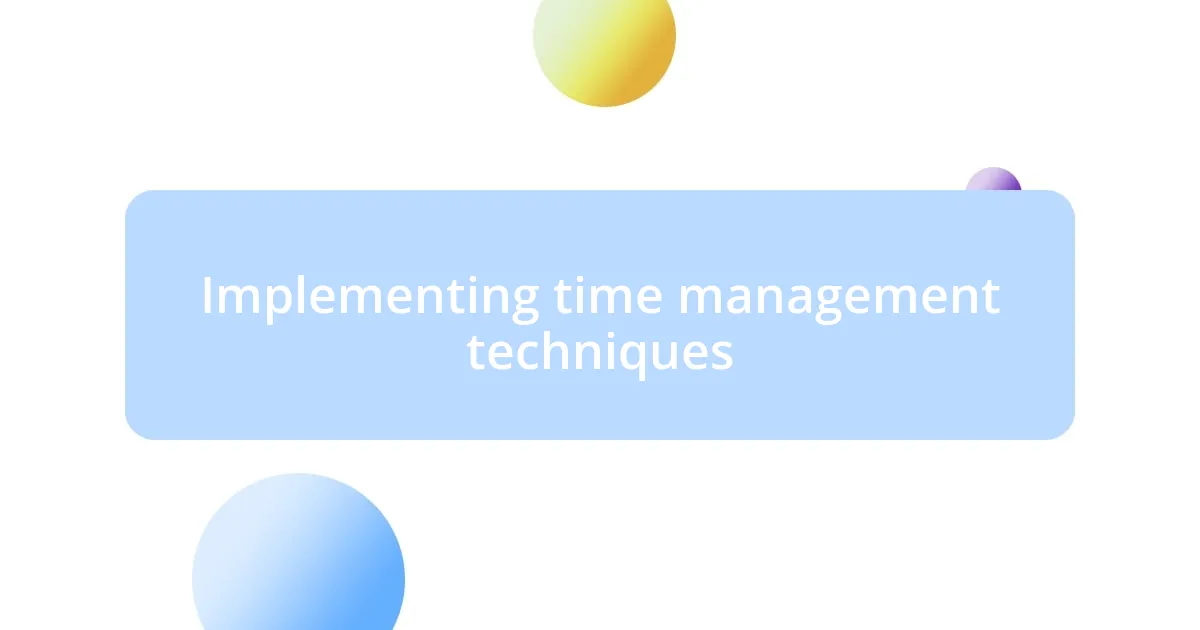
Implementing time management techniques
Implementing effective time management techniques has made a world of difference in my life. One memory that stands out is when I discovered the Pomodoro Technique—working hard for 25 minutes followed by a 5-minute break. It felt almost revolutionary! After first trying it during my studies, I found myself much more focused and energized, instead of the usual feeling of burnout after hours of cramming. Have you ever felt the weight of an endless study session? That pattern really helped me rediscover the joy of learning.
Another technique I embraced was prioritizing tasks using the Eisenhower Matrix. This method helps you distinguish between what’s urgent and important—two concepts that often get blurry. I remember tackling my assignments based on impact rather than urgency, which allowed me to allocate more time to projects that required deep focus. It’s fascinating how simply labeling tasks can shift your mindset from feeling scattered to feeling empowered. Have you ever prioritized tasks only to realize you’re working on the less important ones? It’s eye-opening!
Lastly, I began leveraging digital tools to keep me organized—apps like Trello or Todoist became my best friends. I vividly recall one night when I had a huge project deadline and multiple exams looming over me. I created a visual timeline for my tasks, breaking everything down by days and objectives. This clarity helped reduce my stress significantly. Sometimes it’s hard to believe that refreshing your approach to time management can lead to such profound shifts in confidence and productivity. How about you—have you found tools that resonate with your workflow?
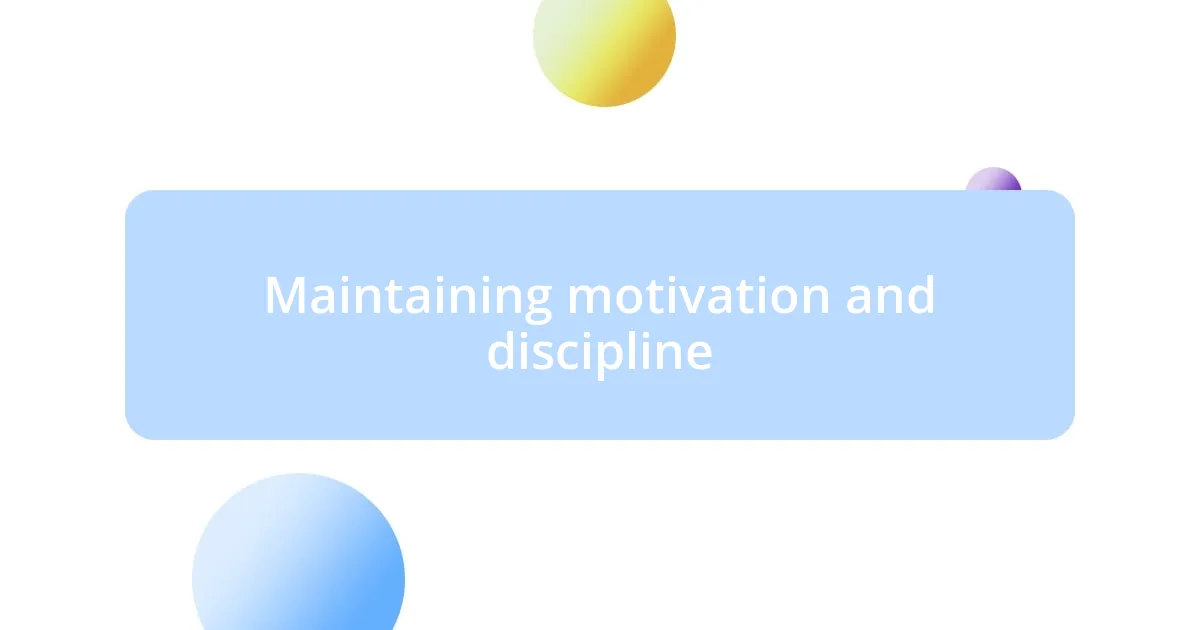
Maintaining motivation and discipline
Maintaining motivation and discipline can often feel like a tightrope walk, especially when juggling work and studies. I vividly remember moments when fatigue set in, making it all too easy to fizzle out. To counter this, I made it a habit to remind myself of my “why” each morning. I’d jot down my motivations on a sticky note and place it on my desk. Those simple words became my guiding light, rekindling my drive on especially daunting days. Have you ever noticed how a little reminder can spark renewed passion?
Another effective strategy I found was creating a routine that worked for me. During my busiest periods, I started my mornings with a motivational podcast—it was incredible how a 20-minute episode could inject energy into my day! The routine installed a rhythm, cultivating discipline and making it easier to dive into my tasks. I fondly recall a day when I felt particularly sluggish but pushed myself to listen to an episode that spoke directly to my challenges. It was like an instant reset! I wondered, could a shift in mindset be the key to pushing through barriers?
Moreover, having an accountability partner can play a massive role in maintaining motivation. I partnered with a fellow student, and we held weekly check-ins. The accountability turned our goals into shared objectives, and it transformed the sometimes-lonely path of studying into a collaborative journey. One week, when I struggled to meet my studying goals, she gently nudged me back on track, reminding me of how far I’d come. This mutual support not only kept us disciplined but also made the experience far more enjoyable. Have you considered who in your life could become your accountability partner?
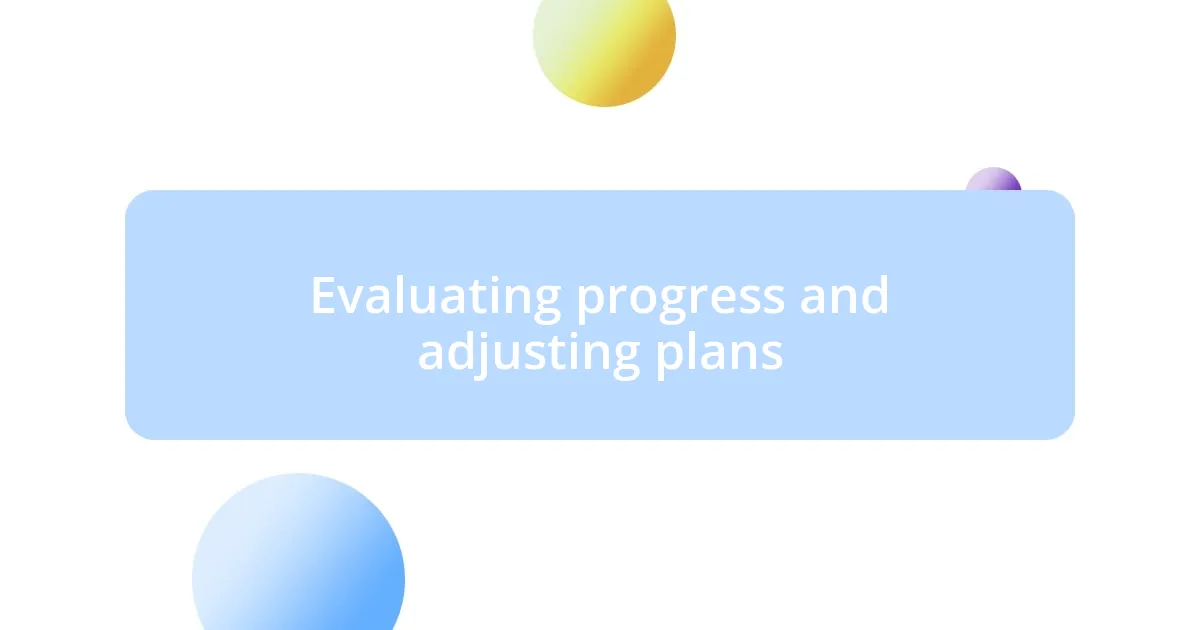
Evaluating progress and adjusting plans
Evaluating progress regularly has been crucial in my journey of balancing work and studies. I learned early on that just glancing over my tasks weekly wasn’t enough. I decided to set aside dedicated time—usually Sunday mornings—to review what I accomplished. During those sessions, I would reflect on what worked and what didn’t. I can still recall feeling a rush of accomplishment when I ticked off major assignments, but also the slight sting of realizing I underestimated one of my projects. It’s interesting how those moments of reflection can lead to significant adjustments in your approach, don’t you think?
Adjusting plans in light of my evaluations often meant reshaping my study schedule based on my performance. For instance, one semester, I noticed my grades in a specific subject lagging behind my expectations. It was a tough pill to swallow, but I recognized that my current method wasn’t cutting it. I sought out additional resources, like online tutorials, and adjusted my study blocks to create more time for intense focus. After implementing these changes, I could genuinely feel the difference, not just academically but emotionally. It’s empowering to realize that simply tweaking your strategy can bring dramatic improvements, right?
I also found that staying flexible was key to maintaining balance. There were times when unexpected work commitments popped up or life threw me a curveball. Instead of panicking, I learned to go with the flow, readjusting my study priorities on the fly. I recall a week when a surprise work project meant rescheduling several nights of study. Rather than viewing it as a setback, I embraced it as a challenge to adapt. Those moments taught me resilience and the importance of being agile with my plans. Have you encountered similar situations, and how did you navigate them?












